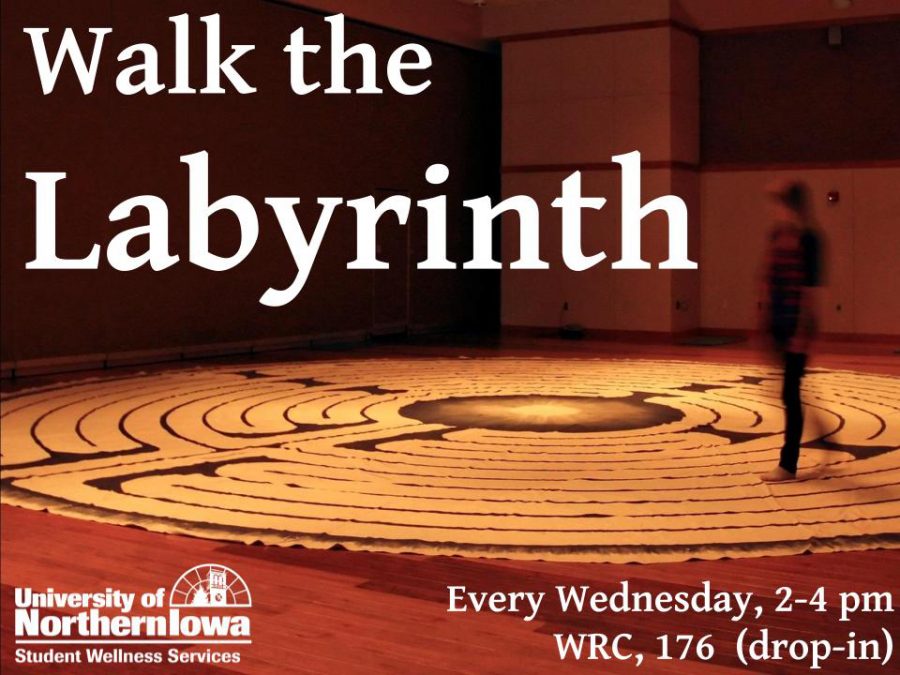Students lose stress in the labyrinth
Student Wellness Services pens a guest column explaining the benefits of walking the labyrinth in the Wellness/Recreation Center (WRC).
Nov 9, 2017
Editor’s note: the following guest column was submitted by UNI Student Wellness Services.
How many times during the week do you allow a quiet moment for yourself to clear your mind and be present in your thoughts? The everyday demands of school, work and life in general make it difficult to carve out that alone time everyone needs.
What if there were two hours every Wednesday that you could go to a quiet place on campus and simply recharge your mind and just be present?
Well, you’re in luck because every Wednesday throughout the rest of the semester, from 2 to 4 p.m. in room 176 of the Wellness/Recreation Center (WRC), you can drop by to walk the labyrinth.
What is the labyrinth, you ask?
The labyrinth is an ancient walking meditation. Labyrinths are very different from a maze as there are no wrong turns, no dead ends and no tricks. They are typically in the form of a circle with a meandering but purposeful path from the edge to the center and then back out again.
This is a tool that can help clear your mind.
The labyrinth is also helpful in calming anxieties during high-stress situations and transitions. Labyrinths can enhance creativity, better connect you to what is sacred and even lead to personal and spiritual growth.
How do you walk it?
Walk slowly as you journey toward the center of the labyrinth, putting one foot in front of the other as you focus on your breathing. When you reach the center, stay as long as you need.
You may stand, sit, lay down or move around. Whenever you are ready, walk the same path out that you took to the center, continuing your walk at a slow pace.
There are many different approaches to walking the labyrinth:
— Choose to let all thoughts go when they present themselves to you. Quiet yourself of all concerns and worries. Just be. Let your soul be still and rest.
— Reflect on where you are in your life. Ask yourself a question. Is there a decision you need to make?
— Use a phrase that you repeat over and over. This phrase may be a favorite saying, a prayer, scripture, piece of poetry or it may be some nonsense word or phrase.
What are the benefits of walking the labyrinth?
While walking one may feel joy in slowing down the pace of life and find peace, insight, reflection, creativity, relaxation and wisdom.
Some view the labyrinth in a metaphorical sense: it can represent one’s life. There are many twists and turns along the way, but everyone is on a single path through their life, having separate and distinct experiences throughout.
After walking the labyrinth, individuals may find answers to their questions about life, while others may find creativity, healing or a newfound wholeness.
Students who walked the labyrinth had this to say about their experience:
“It made me feel relaxed and remember to take life one step at a time. In the middle, it made me remember that in darkness, we will always find light.”
“I really enjoyed the labyrinth. it made me feel completely at peace, which is so rare. I would recommend this greatly.”
“The labyrinth was a great way to step back for a few minutes and reflect. In college, you never have time to just step back, take a breath and reflect. This was much needed, I would say — [a] great experience, and I would do it again in a heartbeat.”
Here at UNI, the labyrinth has been doing amazing work in students’ lives, leaving them feeling relaxed, less stressed, more focused and self-aware. It will be accessible during De-Stress Days on Dec. 11, 12 and 13 from 11 a.m. to 2 p.m. in the Maucker Union Ballroom.
The labyrinth can also be made available for student organizations, events and meetings.
For more information or if you need an accommodation to participate, please contact Joan Thompson at 319-273-2137 or [email protected].
— By Brooke Hottle,
Graduate Assistant,
Student Wellness Services


















David Schick • Nov 10, 2017 at 11:23 pm
I hope the hours are expanded a lot next semester. I’d love to come back and walk this at UNI but it doesn’t fit my schedule. BA CRIM 2005.